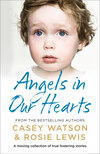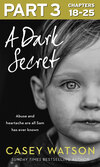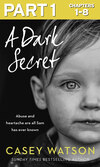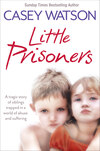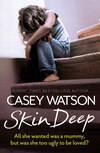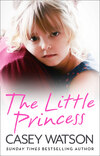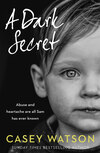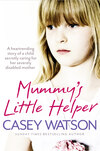Kitabı oku: «Angels in Our Hearts», sayfa 2
Bending on all fours, I lift her vest and lean in to kiss her tummy. She gurgles in delight, her pleasure bolstering my decision to reject the safer caring plan presented to me when I first registered as a foster carer. One of the conditions of the plan is that carers must agree never to tickle foster children. I refused, only signing when that particular condition was removed. Several other carers followed suit, in agreement that there are times when tickling is appropriate. Of course, I wouldn’t launch myself on a child who may have been sexually abused but why shouldn’t a newborn baby know what a raspberry feels like, just because they’re a ward of the state?
Worn out by the excitement, she begins to grizzle so I wrap her in a blanket and gather her in my arms, settling the two of us on the sofa. She lies for a few moments looking up at me as I hold her snugly. Watching her eyes flicker, my head drops back and for a few minutes we doze together.
The telephone jerks me awake. Irritated, I reach for the cordless phone with my spare hand.
‘Hello?’
‘Hi, Rosie.’ It’s Desmond. He hesitates for a moment and I tense, sensing bad news. Complaints against foster carers are common, particularly when mothers see another woman cradling their own newborn baby.
‘Oh dear. Go on, what’s up?’
‘The local authority is moving Sarah on to other carers, quite soon. Next week in fact.’
‘Moving her? Why?’ I glance down at her peaceful face, feeling suddenly angry. I had heard of children moving foster placements for financial reasons. Social services make an effort to place their looked after children with locally registered carers but if they are full or they refuse a placement, agency carers are employed. If a local authority carer then becomes available, the child is sometimes moved on, even if they’ve been settled somewhere for a considerable amount of time. I close my hand around the receiver so tightly that the muscles in my arm begin to ache.
‘Don’t worry, it’s not what you think. The local authority have a couple who have just passed panel and are desperate to adopt a baby. They registered specifically for that reason. The sooner she’s settled, the better.’
I feel as if a cold band is clamping around my heart. I know he’s right, of course. It will be wonderful for Sarah to get the inevitable move over with while she’s so young, so that the new couple are all she’ll ever remember. It’s a system that has worked well in the US and I had read somewhere that various local authorities were trialling the procedure in the UK. The couple risk heartbreak if the local authority is unsuccessful in their application for a full care order, but if Sarah becomes available for adoption, she’ll be settled in a permanent home much sooner than is usual.
I have to wait a moment for the constriction in my chest to ease before I manage to whisper, ‘OK, that’s fine.’ Leaning down, I touch Sarah’s warm forehead with my nose, taken aback by the speed events are taking. Ending the call, I sit listening to the sounds of Sarah’s even breathing and chastise myself for not managing to put my own feelings aside.
Ten a.m. the next morning I’m sitting on a fabric-covered couch in the local authority reception with Sarah fast asleep in my arms, watching the comings and goings of council employees. Sarah’s breathing is deep and regular and, as I watch her, I feel my own heartbeat slowing down.
After a few minutes Sue appears. ‘We’re ready for you.’ She crooks her finger. Obediently I follow her down a corridor decorated with children’s drawings and several posters featuring smiling children above the words, ‘Could you foster?’
Sue stops outside interview room two. From inside I can hear low voices and my heart beats in my throat. Meeting prospective adopters feels almost as nerve wracking as embarking on a blind date. Preparing for the worst and clenching Sarah so tightly to me that my jagged nails dig into my palms, I’m pleasantly surprised when Sue throws the door open on a young couple in their mid-thirties. Perched nervously in seats positioned side by side, they release hands and look up, smiling widely. Most adopters are in their early forties at least and I’m pleased they’re a bit younger than average. It means that they may go on to adopt again in the future. It’s a comfort to think that Sarah might not be an only child.
‘Kate, Paul.’ Sue waves her hands through the space between us. ‘This is Rosie Lewis, Sarah’s foster carer.’
The couple rise in unison, both proffering their hands to shake. Shifting Sarah into my left arm I offer my right, reassured by the firmness of their grip. They meet my eyes and smile warmly. ‘It’s lovely to meet you,’ Kate says, her eyes shining as she glances down at Sarah. I like them immediately.
‘Please.’ Sue gestures for us to sit down and wastes no time getting to the point. ‘We went to panel this morning. It was unanimously agreed that Paul and Kate are a perfect match for Sarah. So, we’ll be able to get her settled into her new home for Christmas.’
‘That’s wonderful news,’ I hear myself say, gulping down the rising emotion in my throat. Meeting her new parents brings home the inevitability of our own little separation. ‘Would you like to hold her?’
Kate sits with one leg crossed over the other, jiggling her foot. ‘Oh yes,’ she says, nodding vigorously and turning to smile at her husband. Their eyes burn with passion as I place their future daughter in her arms.
Paul leans over and pulls the shawl down to reveal Sarah’s face. She is awake now, gazing up at the new faces with interest. Kate holds out her finger and Sarah reaches out, clasping it as she did mine on the day I first met her. Paul’s eyes fill with tears. The couple exchange glances and smile at each other. I turn away, feeling like an unwelcome intruder spying on a private moment.
‘Perhaps you could tell Paul and Kate a bit more about Sarah,’ Sue prompts, an unusual gentleness in her tone. ‘Give them an idea of her routine and what’s she’s like to care for.’
‘She’s lovely, so lovely,’ I say, embarrassed to find my voice cracking.
Sue’s habitually sour, downturned expression softens. She reaches out and rubs my arm, a brisk but comforting gesture. I’m overwhelmed with gratitude at the unexpected show of sympathy.
In the days leading up to the handover I find myself talking to Sarah all the time, trying to hold back my nervousness at letting her go, knowing I’ll probably continue to rock for days after she has left my arms.
The night before she is due to leave I sleep uneasily, tossing and turning. My dreams are confused and when I wake in the morning I feel the same flat sadness of the last few days but decide against trying to shrug it off. It might help me to stay calm, distanced.
When I pick Sarah up from her crib at 6:30 a.m. she is wide awake and gazing around. She catches my eye and smiles so adoringly that my stomach lurches with a longing to keep her. Warming some milk, I realise it’s the last bottle I’ll ever give her. She seems to sense this, frowning in puzzlement as she sucks. I sing through my lullaby repertoire, to give her nice memories to take to her new home.
After her bottle Emily and Jamie ask to give her a short cuddle. They both seem reserved this morning and I feel another little stab of guilt, hoping these endings don’t haunt them when they’re older. I remind myself that fostering has helped them to develop a strong sense of empathy and kindness.
‘Good luck, Sarah,’ they call out before leaving for school. Tonight I plan to take them for a pizza as a reward for being part of a fostering family. It will be good to be out; the house seems to echo with an unwelcome silence for days after a placement has ended, especially a much-loved one. Anyway, Emily and Jamie deserve the important part they play in children’s lives to be acknowledged.
Forcing a bright smile as I wave the children off, I lay Sarah in her crib, watching as she slowly turns her head from side to side. Her eyes drift to the twinkling lights twisted around a miniature Christmas tree on the hearth. Transfixed, her tiny lips form the shape of an ‘O’. Minutes later her tiny fingers uncurl and she drops off into a relaxed sleep, reminding me how far she’s come in a short period of time. Six weeks ago she was tucked up tightly in a ball of drug-induced pain.
While she’s resting I pack her memory box, filling it with items that her adoptive parents will hopefully keep safe for her. I label everything carefully, including a blanket that her birth mother was thoughtful enough to buy before she went into labour and a little pink rabbit with a rattle inside, a present from her grandmother. Little details that may mean so much to her when she’s older. I’ve also written her a life-story book filled with photos of our family, so that she has a record of where she spent her first few weeks of life. Sitting on the floor, I allow myself a few tears as I close the lid, unable to hold back any longer.
When I open the door to Desmond half an hour later I’m sure he notices my swollen eyes, but he knows better than to mention it. It’s a sight he’s seen on a fair number of occasions and I’m grateful for his sensitivity. I know he will hang around when the adoptive couple have left with their new daughter, to hold my hand and congratulate me on a job well done.
‘You’s looking particularly dreadful this morning, Rosie,’ he jokes, aware that any hint at sympathy would set me off. I hoot with laughter, the chuckle catching as a little sob at the back of my throat.
Some foster carers are able to cope with separation more easily than others. I was hoping that with time I would get better at letting go, but I’m still a work in progress as far as that’s concerned. With babies I find it particularly difficult to keep my distance and not become attached, even though I know my job requires me to maintain a cool professionalism.
For the next half an hour, while we wait for the new couple to arrive, I busy myself folding Sarah’s freshly washed little clothes and packing them into her new Peter Rabbit suitcase. Desmond chatters away in the background but I hardly notice what he’s saying, I’m so distracted. I try not to look at him, knowing that if I meet his eye my guard will come crashing down.
With fifteen minutes to pass I sit on the sofa, Sarah in my arms. I take a few deep breaths, trying to dislodge the uncomfortable knotting sensation in my stomach. Wanting some warning before they descend, so that I can gather myself, I fix my eyes on the window, watching the part of the road I can see beyond the front garden.
Paul and Kate arrive a few minutes earlier than planned, no doubt itching to begin this next exciting phase of their lives. It seems like such a long time since I first met them, even though it was only a week earlier. With older children the handover periods tend to be much longer, but with a baby as young as Sarah it’s over with quickly, with only one or two pre-planned meetings before the big day.
The atmosphere is a little forced as I fuss around offering them tea and biscuits, my breakfast churning vengefully in my stomach. Kate perches on the edge of the sofa, her mouth working at the edges. Her husband hovers in the doorway, his eyes barely leaving Sarah’s peaceful face as she snoozes in her crib. They’re probably desperate to get away but the formalities have to be attended to, medical information imparted, etc. I try to keep the atmosphere light; this is, after all, one of the happiest days of their lives. I have heard that adopters find the final handover day almost as traumatic as the foster carer, as if they’re stealing someone’s own child.
With details exchanged and forms signed there is not much else to be said. Unexpectedly, Kate walks over and squeezes my arm. ‘I want you to know we’ve waited a long time for this day. Thank you for taking such good care of her.’
The well of tears I was fighting to hold down threatens to overflow. Reassured that Sarah is going to someone sensitive and kind, I gulp, nodding in acknowledgement. I don’t really trust myself to speak as I lift the sleepy baby from her crib, tucking her blanket gently around her.
‘Well, tha’ seems to be everything covered,’ Desmond says as he walks over to me, tactfully touching my shoulder to remind me that we have a job to do.
Surrendering someone so vulnerable to an unknown future feels unnatural, wrong even. Every instinct shouts at me to hold on to Sarah but I summon all my mental energy and brush a brief kiss on her warm forehead. ‘Be happy,’ I whisper, ignoring the ache in my chest and planting her firmly in the social worker’s arms.
As Desmond turns to cross the room I hold onto the thought that whatever life holds in store for Sarah, at least during her first six weeks she was cocooned, suspended for a short while in a net of love and safety. I hope that I’ll see her again one day, even though I know it’s unlikely. Adoptive couples often prefer to draw a line under the past, a sentiment I can sympathise with, however difficult it can be for foster carers to accept.
‘Do you think she’ll be alright?’ I ask Desmond as we watch her for-ever parents settle Sarah’s seat into their car then exchange a tender kiss over the open passenger door. I give up trying to hold back the tears.
‘She is a much-wanted child.’ Desmond, a rock at times like this, wraps a steady arm around my trembling shoulders and draws me back into the house. ‘They’ll cherish her,’ he assures me, leading me into the kitchen. ‘You’s no’ to worry. Now, put tha’ kettle on. I need to give you the heads up on an urgent case we’ve just had in.’
And so the wheel turns, I think, as I never cease to wonder how lucky I am to have found such a special job.

A Small Boy’s Cry
With the familiar pips of the BBC News at Ten’s closing music pulsing away in the background, I secure the dead bolt on the back door and walk back through the kitchen. My eyes stray to the smiley face etched onto one of the cupboard doors – a legacy of three-year-old Alfie – then I go through to our ‘lived-in’ lounge, where a carefully placed coffee table fails to conceal a lingering pink glow on the carpet: fuchsia nail varnish, courtesy of Amy.
Amy was fifteen years old when she arrived as an emergency placement the previous year, staying with us for four weeks. By the time she left we were more or less buddies (what’s a few cracked vases and a broken television between friends?), although her arrival and the ensuing days while she acclimatised to the sobering reality of living in a cannabis-free house were, to use social services’ mild description, ‘challenging’.
But I don’t mind that much if our home is less than perfect. Not really. Dimming the lights on our weathered but cosy rooms, I climb the stairs knowing that I wouldn’t have it any other way. Smudges on the window panes or scribbles on walls can be erased with some elbow grease or a splash of paint, the effort more than compensated for by the hope that the children we have fostered aren’t the only ones to leave their mark behind.
It’s nice to think that the time they’ve spent in our family leaves its own impression. Muddy walks in windswept woodlands, splashing through puddles on a rainy afternoon, drinking hot cocoa while playing board games in front of the log fire; the simple, gentle monotony of everyday life spent with people who care leaves an imprint, perhaps even replacing some earlier, less tranquil memories. Sometimes, all it takes to make a positive difference to a young life is just one adult who cares enough to show an interest. Carving a place in a troubled heart nurtures resilience, buffering whatever turbulence may lie ahead when the haven of foster care has ended.
Up in my bedroom I climb into bed, leaving my clothes and mobile phone within reach. Tonight I’m on call and covering the eleven-to-eighteen age range, as well as my usual under-tens. Switching my electric blanket on, I can’t help but wonder if I’ll be needed and who it might be. When covering such a wide age range, I have to be prepared for anything. Jenny, a fostering friend of mine, recently accepted an unaccompanied minor while on call. When the Somalian arrived at her house, she couldn’t help but notice his emerging facial hair and rippling six pack; it turns out that Nafiso was, in fact, twenty-one.
However much my imagination strayed, I must have dropped off fairly quickly because when my phone dances impatiently around the top of my bedside cabinet and I reach out to switch the lamp back on, the bulb is still hot. Still half asleep, I reluctantly grope for the ANSWER button.
‘Hello,’ I answer croakily, switching to loudspeaker mode and blinking rapidly in the soft light. My pulse quickens at the sound of Des’s Scottish burr.
‘I’m just giving you the heads-up, Rosie,’ my supervising social worker tells me in an urgent tone, converting my adrenaline into action.
I force myself to my feet and dress hurriedly, pulling on an old jumper, leggings and a pair of fluffy socks. At 1 a.m. in mid-November, the temperature is already dipping close to zero.
‘Boy, aged three. Suspected neglect. He’s receiving emergency treatment at the moment. Not sure how long he’ll be at the hospital but you’s best get yourself ready.’
Aw, three, I think, aware of a familiar clawing in my stomach; it’s the desire to make him all better before he’s even arrived. Des promises to ping the details through to me and reminds me I can call him for support any time, day or night. After making a quick coffee I switch on the computer and open the email sitting in my inbox from Des.
EMERGENCY PLACEMENT REQUIRED
Charlie SMITH, age three
Charlie has been on the vulnerable children’s register since birth, as his mother, Tracy, has struggled for years with depression and addiction issues. With support, Tracy has demonstrated that she’s able to meet Charlie’s basic needs, but he’s rarely present at nursery, and neighbours have complained of continued bouts of crying coming from their flat. Tracy has no extended family or network of friends to offer support.
Late this evening Charlie was found wandering the concrete walkway below the family home. Though his vocabulary seems limited, the boy indicated to a passer-by that he had fallen from the first-floor window. Police were unable to rouse his mother when they entered the flat. She appeared to be heavily intoxicated. Charlie’s currently in A&E where he’s receiving treatment for a gash to the head. An urgent foster placement is required while investigations are carried out.
I click ‘X’ to close the window, and sit staring at the blank screen for a moment. It sounds to me like both Charlie and his mother have been living an isolated existence, with no one but professionals around to offer support. My stomach begins to churn, as it does whenever someone new is about to arrive.
Stop fretting, I tell myself. If Des were here he would say, ‘You’s haven’t done too badly so far, m’darling.’ All of the children I’ve cared for in my years as a foster carer have left happier than when they came, so I suppose he’d be right. Knowing the trauma Charlie has been through, I feel the familiar tug to offer comfort intensifying. The chance comes sooner than expected. Just as I’m finishing the dregs of my coffee, the doorbell rings.
Charlie stands on the doorstep, the top of his mousy-coloured hair bathed in pale moonlight. The delicate skin above his right eye is covered with white gauze and tape, held in place by a bandage circling his head like a bandana. I can’t see his face as he’s staring down at his black plimsolls, but I notice how tiny he looks next to the stocky police officer beside him. It’s freezing, but all he’s wearing is a pair of dirty pyjamas. A middle-aged woman, presumably the duty social worker, hovers behind.
‘I’m Evelyn,’ she says, leaning around the officer who’s massaging Charlie’s shoulder with meaty fingers.
‘Hello, Evelyn. And you must be Charlie,’ I say softly, crouching down to his level.
His eyes are barely visible under a heavy crop of wispy hair, but I can sense bewilderment there. His features are small and appealing but unusually angular for a child so young – he’s much too thin. His head hangs awkwardly to one side, as if it’s too heavy or uncomfortable to hold up. I feel a rush of pity.
‘You look freezing. Come in, all of you.’
‘He wouldn’t let me carry him or wrap him in my coat,’ Evelyn says, as she follows me through the hall, her fingers on Charlie’s back, propelling him in. His eyes are swollen with tiredness. ‘And we couldn’t find anything warm for him at the flat.’
She hands me a small, grubby Fireman Sam rucksack. ‘Here are a few of his bits, but not much, I’m afraid.’
When we reach the living room she leans towards me. ‘Most of his clothes were damp, covered in all sorts. Mum was so out of it we couldn’t make head or tail of what she was saying.’
‘It’s OK,’ I say. ‘I have spares.’
Turning to Charlie, I kneel beside him. He stares at me with an anxious frown.
‘Don’t worry, Charlie, everything will be fine. We’ll find you some things to wear in the morning. I’m Rosie, by the way. You’ll be staying with me for a bit. You’re safe here, sweetie.’
The police officer, a man in his forties with closely cropped dark hair, smiles warmly at me, then grimaces and shakes his head, his expression saying: doesn’t bear thinking about, does it?
Evelyn and the officer sit on the sofa, and Charlie sinks down on the rug in the middle of the floor, exhausted.
‘I know the mum.’ The social worker speaks out of the corner of her mouth like a ventriloquist, as if Charlie would be unable to hear that way. ‘I was hoping she’d get a grip on things, but …’ She gives a weary sigh, shrugging her shoulders. ‘Well, you know …’
I nod. How many times had I seen it now? An over-dependence on alcohol or drugs – or both – and a child’s chances of having a good day or a harrowing one spin on a penny, all determined by the chemicals pulsing through their mother’s veins. It’s not always beatings and bruises that signal the end of a birth family and the beginning of life in foster care, I muse. Sometimes it’s a simple case of daily deterioration, the slow unravelling of a mother’s ability to cope. I flick my mind back to the early days, after my daughter Emily was born.
Catapulted into a life without the reassuring structure of work, I felt isolated and lonely. Each day was seemingly endless, and the monotonous cycle of changing, feeding and rocking really got me down. If someone had told me back then that I would soon choose to spend my life caring for other people’s children, I would have pronounced them deluded. Remembering how lost I felt, it doesn’t take a huge stretch of the imagination to think that I too might have been unable to cope, perhaps drifting towards a crutch to numb the feelings of uselessness. I shudder at the thought, feeling a stab of pity for both mother and child.
Charlie’s chin is quivering. I’m not sure whether it’s with cold, fear or perhaps because his head’s aching.
‘When did he last have pain relief?’ I ask Evelyn, while I reach behind the sofa for a small, pale-blue blanket. I drape it around his shoulders then sit quietly beside him, letting him get used to having me near. He looks sideways at me with solemn eyes and I smile, noticing that his face is dotted with fine white crusts, presumably salty deposits from anxious tears at separating from Mum.
‘Just before we left the hospital, about …’ Evelyn inclines her head towards the police officer.
He checks his watch, pursing his lips. ‘About half an hour or so ago, I’d say.’
I nod grimly, knowing that the poor little mite is in for a rough few days. With his legs splayed and shoulders hunched over, Charlie looks like he’s reached the same conclusion, as if he’s lost all hope at the tender age of three. Watching as he nibbles his fingernails, tearing into the ragged skin, I’m flooded with a longing to pick him up and soothe him.
It’s actually this first, unscripted half an hour or so that I find the most difficult, when I’m weighing up what the child needs, trying to read their signals. I’m getting better at it. In the early days I was overly attentive, moving awkwardly around children who probably would have preferred a little distance while they adapted to their new environment. I would fuss around, straightening toy boxes that were doing perfectly well where they were, and offering endless litres of juice and other refreshments. Experience has taught me to hold back a little.
Evelyn hands me a short report from the hospital to read. I’m pleased she’s decided not to discuss everything in front of Charlie, especially once I read the contents. It seems that his short life has been peppered with regular trips to the emergency department – scalding-hot tea spilt on him when he was just three months old, stitches at the age of nine months after a falling shelf happened to catch him on the head. The depressing list goes on and suddenly Charlie’s mother becomes a more shadowy figure. My sympathy wanes.
It’s a familiar tale. Another early childhood eroded by circumstances, leaving the vulnerable – well, Charlie at least – lost, scared and sitting alone in a heap on my rug. It will take a while for the fragments of his short life to be pieced together. With an investigation underway, nursery teachers, GPs, health visitors, everyone who has come into contact with Charlie will be interviewed and the jigsaw will eventually be pieced together. Of course, there will be gaps, ones that perhaps only his mother will ever be able to fill. The emerging picture will hopefully reveal neglect and not wilful abuse; I still struggle to come to terms with the possibility that a mother could deliberately harm her own child. However many times I hear about it, my brain just can’t assimilate something that disturbing.
The rest of the hospital report matches what was summarised in Des’s email and, for now, what more do I need to know? Evelyn hands me a leaflet – Care Following a Head Injury – reminding me of my own duty of care. Every parent knows how heavily the responsibility of caring for a child can sometimes weigh, especially when they’re unwell. That responsibility increases tenfold when that child is a ward of the state. For a brief moment I feel overwhelmed, but then I remind myself that help is just a phone call away, should Charlie take a turn for the worse.
‘They’ve assured us that there’s no sign of serious injury,’ Evelyn says, perhaps noticing the cloud passing over my face, ‘but best keep a close eye on him. It seems he had a soft landing so they don’t think he bumped his head. From what the neighbours had to say, he cut his head on the lid of a tin can, but if there’s any vomiting or you’re at all concerned …’ She makes an L shape with her forefinger and thumb, raising her hand to her ear in imitation of a phone.
‘Don’t worry, I’ll stay close by.’
Evelyn hands me a placement agreement to sign and I scribble my signature, longing for her and the constable to leave so that I can get Charlie settled.
‘Well, we’ll leave you to it.’
Evelyn zips up her bag and rises to her feet. The movement rouses Charlie, who was beginning to nod off where he sat. His head shoots up and he howls, rocking back and forth in a self-soothing action. To see such a small boy surrounded by adults and yet too afraid to reach out to any of us for comfort almost makes me weep. He must think the world an unfriendly place and I wonder how he’ll cope with all the turmoil ahead. Children in care have to adjust to lots of different people coming and going in their lives.
‘Aw, it’s all right, sweetie,’ I whisper, reaching down to lift him up. His legs dangle lifelessly around my hips but he stops howling, tears rolling silently down his cheeks. He must have feared we were all about to abandon him.
‘I’m not going anywhere, honey. I’m going to take care of you.’
He nuzzles his face into my shoulder. I can feel heat from his little body pressing against my side. His bandaged head rests against my cheek, the sticky tape cold against my skin. With Charlie perched on my hip I walk quickly through the hall to show Evelyn and the officer to the door, wondering if Charlie’s path had been mapped out from the moment he was born. Could his mother, on the day she first cupped his tiny head in the palm of her hand, ever have imagined that barely three years later she would lose him, at least for the foreseeable future? The might of social services rides like a steam roller over families, whose fate sometimes turns on which social worker is assigned to work on their case.
On my way back to the living room I fall into the classic words of comfort – ‘There, there, it’s all right, you’re safe here, baby, no need to cry. Hush now, sweetie, everything’s going to be fine’ – but I suspect that Charlie’s in a place where words won’t reach him. With his face tear-streaked he glances up at me, his dirty, overlong fringe falling across his eyes. Close up he smells of hospitals, although antiseptic masks another, acrid stench: tobacco and something muskier.
‘Come on, sweetie. Let’s get you a drink and then we’ll tuck you up, shall we?’
I walk to the kitchen, chatting in soft, sing-song tones. As I pour the milk I notice him watching me with a sullen wariness. He really could do with a bath, but I won’t put him through the trauma at this time of night. What he needs, over and above anything else, is sleep. I hand him a beaker of milk and he takes it, listlessly running the sippy lid over his lips.
